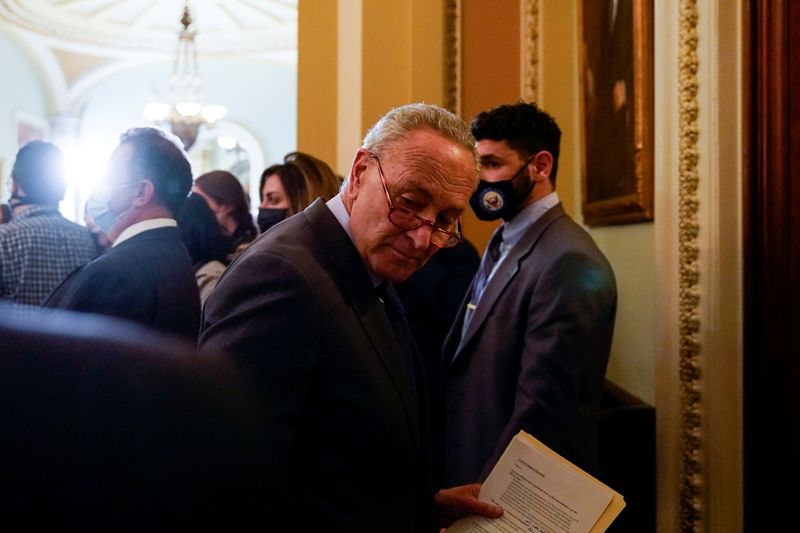WASHINGTON (Reuters) -The U.S. House of Representatives could vote this week to raise the federal government’s $28.9 trillion debt limit, the chamber’s No. 2 Democrat told reporters on Monday, without providing details on how such an effort might unfold.
Treasury Secretary Janet Yellen has urged Congress to act by Dec. 15 and a bipartisan think tank warned https://www.reuters.com/markets/us/what-happens-if-washington-falls-behind-its-bills-2021-12-03 last week the U.S. government could run out of ways to cover its obligations by late this month, which would trigger an unprecedented default that would rock the global financial system.
“Hopefully we will be able to resolve a way that that (a debt limit bill) can be done in the next few days,” House Majority Leader Steny Hoyer told a news conference.
Top Republicans have been calling on President Joe Biden’s Democrats to hike the debt limit without Republican votes, using a process known as reconciliation. Democrats note the increased debt is needed largely to cover the cost of tax cuts and spending programs during former President Donald Trump’s administration, which congressional Republicans supported.
But Democratic leaders in the House and Senate were searching for a way to win passage.
Senate Republicans also expressed optimism that Senate Majority Leader Chuck Schumer and his Republican counterpart, Mitch McConnell, would soon work out a debt ceiling agreement.
“I don’t think that anybody wants to see the full faith and credit of the United States damaged. And so, I’m an optimist,” Senator John Cornyn said after a meeting with McConnell and other leading Republican lawmakers.
Cornyn said he believes the Treasury could extend its debt ceiling deadline into January, possibly by using money from the Highway Trust Fund.
“But I don’t see any reason to delay the conversation,” he said of ongoing talks between Schumer and McConnell. “If they can get this behind us, I think we’d all be better off.”
Hoyer said it was possible that Democrats would attach the debt-hike initiative to a national defense authorization bill now moving through Congress.
A sizeable number of liberal Democrats voted against House passage of the defense bill and attaching the debt limit to it could ruin chances for getting enough Republican votes as well after the Senate passes a revised version.
AMONG SEVERAL MAJOR INITIATIVES
The debt limit is just one of several major initiatives that Democratic congressional leaders want to debate before the end of the year.
Schumer also wants additional votes on voting rights reforms, which have been repeatedly blocked by Senate Republicans, and Biden’s $1.75 trillion “Build Back Better” domestic investments bill this month.
Schumer noted that the Senate parliamentarian still has to review many components of the legislation, including an immigration provision, and decide whether they qualify to be included in the bill under a special budget reconciliation process that imposes tighter controls than regular legislation.
He did not say how he would advance voting rights legislation if Republicans engage in an expected filibuster that would require 60 votes in the 100-member chamber to break a deadlock. Many Democrats have been urging Schumer to push for a change in the Senate’s filibuster rule.
Last week, following a meeting Schumer held with a group of Democrats, Senator Jon Tester said he doubted a showdown over the filibuster could be staged this month given the Senate’s heavy legislative schedule.
“There’s just too much stuff on the docket,” he told Reuters.
(Reporting by Richard Cowan; Additional reporting by David Morgan; Editing by Scott Malone and Peter Cooney)


























